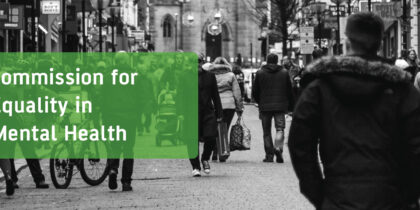The climate emergency poses a threat to all our futures. It is already causing major risks to the lives and livelihoods of people and communities globally. The threat to our mental health is seldom acknowledged in discussions about climate change and its effects, yet the harm is already considerable and likely to get worse over time.
The mental health impacts of climate change can be seen both globally and locally: for example in the long-term psychological harm caused by flood damage. What we can currently see is, however, the tip of the iceberg.
Evidence is still emerging about the impacts on mental health of heatwaves, wildfires, storms, and other climate-related disasters. And in the longer term, the impacts on communities that are displaced by climate changes or related disease outbreaks is likely to be greater still.
There is also persuasive evidence that the impacts of climate-related harm will be greatest on those with the fewest resources, exacerbating existing health and socio-economic inequalities. Climate change is a humanitarian crisis, and as such its effects on mental health will be profound.
Action to address climate change is by necessity a global undertaking. It requires system change on an unprecedented scale affecting every aspect of our lives. It also demands social change. The pursuit of better mental health for all, racial justice and equality across all dimensions is inextricably linked to the fight for environmental sustainability.
We all have a responsibility to be a part of the change. And at Centre for Mental Health we recognise that this is an emergency and that we have to do our part. We plan to do this in three ways:
First, we will seek to minimise the negative impact of our business activity on the environment. This means reducing our use of carbon, for example by minimising travel when it is not essential, by promoting sustainable travel options and holding major events online. Our policies and practices will be designed to maximise benefit to the environment as well as the wellbeing of our staff, volunteers, participants and beneficiaries.
Second, we will work with our partners to boost climate resilience in new and existing projects. This will include new work to understand how climate resilience and better mental health can cohere to bring about long-term change that benefits people and their environments. By pursuing mental health equality and social justice, we will take explicit and proactive steps also to promote climate justice and to build up evidence about ways of achieving these together.
Third, we will facilitate cooperation nationally, internationally and locally to support and make the case for system change for better mental health and climate resilience. This will mean challenging power relationships and dynamics that impede progress and change. By working collaboratively, we can harness learning from community action and activism to foster larger scale change to policies, practices and institutions.
The climate crisis cannot wait. Without action, it poses an immediate threat to all of our mental health, and that of future generations. Collective action can make a difference. Today we are making our commitment to that effort so that our work can contribute to a more sustainable, fairer and just future for people worldwide.




